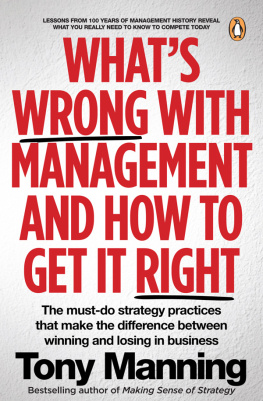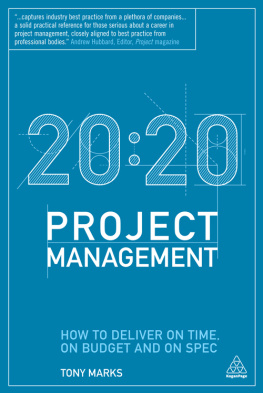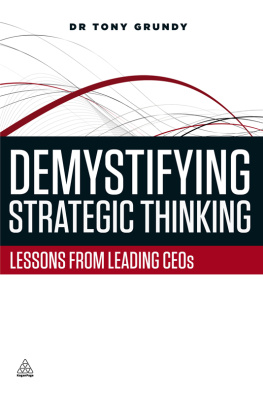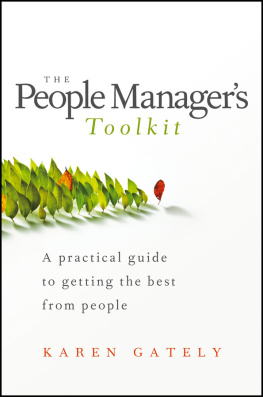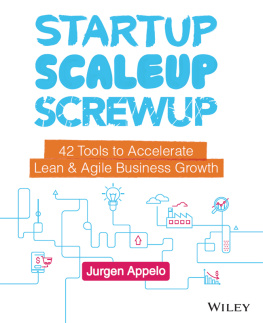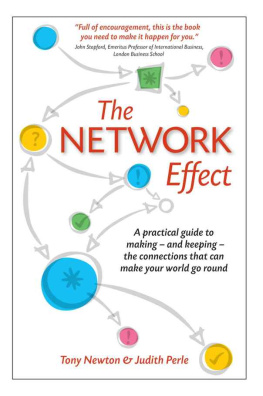I frequently refer to my interactions with Tony Manning as getting juiced up refuelling my tank. His ability to understand the complex technical and business issues we are dealing with, yet keep us focused on what will truly sustain us in the future, is remarkable.
Len Fantasia, Vice President, Quality & Compliance Services Worldwide, Johnson & Johnson
Praise for Making Sense of Strategy
Making Sense of Strategy is a brief but highly useful discussion of modern strategic management from the perspective of an experienced practitioner. Tony Manning is able to take many commonly held ideas in strategy and weave them into a simple, yet elegant tapestry for appreciating the art of management The book is recommended for MBA programs, especially executive MBA programs, and all managers who doubt their impact on the long-term success of the firm. For anyone wishing to make an organization more effective, reading Making Sense of Strategy will be an hour well spent.
Jeffrey P. Katz, Academy of Management Executive
Good strategy is based on only a few principles and Manning has captured them all. The shortest strategy read available, yet still comprehensive. The perfect companion for the busy executive.
Professor Andrew Campbell, Director, Ashridge Strategic Management Centre, London
Praise for Discovering the Essence of Leadership
The book is an astonishing mixture of inspiration and practical business advice It is the finest work available for the busy businessperson who wants to get to grips with the subject.
Wessel Ebersohn, Succeed
Praise for Competing Through Value Management
An easily readable book, a useful tool for enabling managers to get a step ahead of the competition a must read for managers at all levels.
Rob Sampson, Saturday Dispatch
Tony Mannings
Management Toolkit
Tony Mannings
Management Toolkit

Published by Zebra Press an
imprint of Random House Struik (Pty) Ltd
Reg. No. 1966/003153/07
Wembley Square, First Floor, Solan Road, Gardens, Cape Town 8001
PO Box 1144, Cape Town, 8000 South Africa
www.zebrapress.co.za
First published 2004
Publication Zebra Press 2004
Text Tony Manning 2004
Illustrations on pages Microsoft clipart
All rights reserved. No part of this publication may be reproduced, stored in a retrieval system or transmitted, in any form or by any means, electronic, mechanical, photocopying, recording or otherwise, without the prior written permission of the copyright owners.
PUBLISHER: Marlene Fryer
MANAGING EDITOR: Robert Plummer
TEXT DESIGNER: Natascha Adendorff
TYPESETTER: Natascha Adendorff
ISBN 978 1 86872 912 8 (print)
ISBN 978 1 77022 256 4 (ePub)
ISBN 978 1 77022 257 1 (PDF)

Over 50 000 unique African images available to purchase
from our image bank at www.imagesofafrica.co.za
For Sandy and Lee
Thanks for being there
And being you
And bringing so much
To my life
Contents
Introduction
Ive been working as a consultant to big companies for almost 20 years. Ive also written a lot about management. Along the way, Ive sat in thousands of meetings, read hundreds of books and thousands of articles, attended business school programmes and conferences, and spent countless hours reflecting on what Ive seen, heard, and read. And one question keeps buzzing in my head:
If management is so hard, why do we complicate it even more?
The world is a complex place. Things are always changing, and a small shift here triggers tidal waves over there. Competition in every industry is increasingly hostile and often comes from outside your industry. Speed is everything. If you dont move and improve faster than the other guy, you get mowed down.
At the same time, organizations are living things. People are their basic building block, and people behave in strange ways. One minute they get on with each other, the next minute theyre at each others throats. They can be charming, creative, cooperative, and candid or a pain in the ass.
The task of management is somehow to make sense of whats happening outside, and then to get the right things happening inside. Neither is easy. And many of the tools touted as being just the thing for the job are not helpful. In fact, some are not only downright useless, theyre also dangerous.
For many years, Ive held the view that business performance is held back by the very people who purport to know how to improve it. Of course, executives must get the blame. But theyre not always helped by the gurus who offer help. A typical business school education, for example, offers a mind-numbing array of tools. Books, magazines, and training programmes add confusion. Ask the average manager, What three ideas work best for you? and hell be stuck for an answer. Ask three executives the same question, and youll be thoroughly confused.
Good management is essential to companies and countries. Developing good managers has to be a priority. The process would be dramatically accelerated if less time were spent on learning about exotic tools and more on using the ones that actually make a difference. Most of the concepts we need have been around for decades. When we ignore them or use them badly, we run into trouble. Trying something newer and flashier doesnt help.
When managers talk strategy, they almost always have a language problem. There are two reasons for this:
1. They use the same terms to mean different things because they understand concepts differently. Core competence means one thing to Jim and another to Penny. Low cost operator, customer intimacy, and value migration are interpreted in various ways.
2. Their experience makes them champions or sceptics of various ideas. One fancies a theory just published in the Harvard Business Review. Another attended a business school course where she got hooked on a particular jargon. A third has just finished a bestselling business book and hes sure it holds the real answers to life.
The result is that people spend a lot of time talking past each other. They also waste time wrestling over which techniques to use We need a new vision and missionLets do a SWOT analysisWhat about some scenarios? Why dont we try brainstorming? Wouldnt all this work better if we broke into small groups?
My purpose in this small book is to give you a toolkit worth carrying. One thatll help you get past language barriers and concept wars, so you can focus on important issues and deal with them in the easiest and best way.
You can dip into it wherever you like. Maybe you have a problem to solve: youll find answers here to many of the questions executives face every day. Maybe you want to get a specific message to your troops: there are plenty of those as well. Or maybe you want a quote, a questionnaire, a framework, or a concept for your next meeting. Look no further.
Theres a lot of meat in these 140 pages. Theres stuff on the new business arena, strategy, organizational design, people, and much else. But no fat.
No manager needs all these tools all the time. Questions that are critical for one company at a particular time may not be important at another time or to another company. A model or framework that helps you may not be what someone else needs. At some stage, though, every executive needs to think about everything here.


